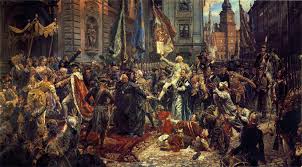229 Anniversary of the Polish Constitution of May 3, 1791
The 3rd of May is a very special day in Polish history. It was on this day in 1791 that the first written Constitution in Europe and only the second in the world was proclaimed in Warsaw, Poland. Since then, the Constitution of May 3rd has served the Polish nation as a symbol of progress, independence and the rule of law, values of great significance for all nations in the contemporary world. It also provided a source of inspiration during Poland’s struggles for freedom and sovereignty in the centuries that followed, with May 3rd becoming the first national holiday to be officially introduced in the Second Polish Republic (1919).
Among the many significant reforms introduced by the Constitution of May 3rd, 1791 were the establishment of a constitutional monarchy and the separation of powers into legislative, executive and judicial branches of government. Most importantly, however, the Constitution of May 3rd introduced political equality between townspeople and nobility and placed the downtrodden peasant class under the protection of the government. In so doing the Constitution guaranteed freedom and equality for all Poles regardless of their social status or religion, bringing hope for a new beginning for Poland, a hope that was dashed by foreign response to the Constitution. The hope lay dormant for over a century due to the Commonwealth’s third partition in 1795, but it pointed to the direction that was eventually taken by every European power.
It is for these reasons that the Constitution of May 3rd is celebrated annually as a pivotal marker in the history of modern Poland.
—
229 rocznica uchwalenia Konstytucji 3 Maja
Po raz kolejny od 228 lat obchodzimy rocznicę uchwalenia Konstytucji 3 maja. Druga konstytucja w świecie, po amerykańskiej, a pierwsza w Europie ( przed francuską rewolucyjną) jest powodem do dumy narodowej. Zaprzecza kontrowersyjnej, często transmitowanej na Zachodzie tezie o „zacofaniu” kulturowo-cywilizacyjnym Rzeczypospolitej na tle Europy. Ta wyjątkowa Ustawa Rządowa nie weszła w życie za przyczyną rodzimej Targowicy, interwencji Rosji a później II i III rozbioru Rzeczypospolitej. Pozostała jednak testamentem dla wielu następnych pokoleń Polaków walczących o wolną, suwerenną Ojczyznę.
Dokument ten był dla Europy swoistym drogowskazem demokracji, fundamentem nowoczesnego systemu politycznego oraz wyznacznikiem europejskiej tradycji parlamentarnej.
Pierwszą rocznicę uchwalenia konstytucji obchodzono wyjątkowo uroczyście. Papież Pius VI przekazał Polakom specjalne błogosławieństwo, wyrażając zgodę na przeniesienie święta patrona Polski, św. Stanisława z 8 na 3 maja. Niestety, kilka dni pozniej, na rozkaz Petersburga oraz „usilne błagania zdrowej części narodu” (wrogów nowego porządku państwowego), rosyjska armia przekroczyła granice Rzeczypospolitej. Wybuchła Konfederacja Targowicka a wspierani przez Zagranicę (Petersburg) rodzimi zwolennicy zasad „żeby było tak jak było” zdławili reformy, przywracając zabójcze dla państwa ustawodawstwo. Trzy lata po tych wydarzeniach Polska przestała istnieć.
Czy historia może się powtarzać?
Jak wiele w tych ważnych dla Polaków wydarzeniach, zauważyć można analogii w odniesieniu do aktualnej sytuacji naszej Ojczyzny. Także my na emigracji możemy wspierać Polskę, bronić jej Dobrego Imienia i interesów, reagować na medialne ataki. To nasz obowiązek, Polska to nasza Ojczyzna, Ojczyzna Polaków nad Wisłą, ale i tych wszystkich, którzy czują się Polakami.
Warto o tym myśleć w kontekście wydarzeń z ponad 200 lat.








